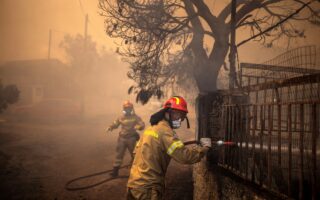Normalizing the unspeakable

What our eyes witnessed this week in Piraeus, our minds couldn’t absorb. The facts, though, were obvious.
The scenario: A young man is late for his boat ride home. Before the ferry departs, while the ship’s loading ramp is still down, he quickly leaps onto it in order to travel. His ticket has been paid. Members of the crew reject his pleas to board, and push him back towards the dock. He desperately tries again, they push him off the ramp, and he falls into the murky water below. No one helps him. He drowns.
Were their actions misconstrued? Did they intend to murder the man? It doesn’t matter. They risked it. He fell. He died. Motive here is irrelevant. Were they vicious murderers? Perhaps. Perhaps not. But one thing we know: Their utter indifference, their lack of any human regard, is what enflamed the entire nation, bringing it to a proverbial halt, a maelstrom of shock and horror in witnessing the sheer indifference to human life. Articles flooded media sites. Social media exploded in rage. People gathered at ports to show their utter disbelief and fury. Government and business leaders were confronted and will probably lose their positions. The nation’s moral and ethical voices demand it.
Tremendously sad, I then thought about the country of my birth, where I lived most of my life. Perhaps there was a time when Americans would react in a similar fashion. Perhaps, somewhere, in small towns in the US, they still do. But probably not. America has changed radically; its very fabric, its collective psychology, has eroded.
Since arriving to live permanently in Greece 10 years ago, I have been absorbed by my anthropological journey and observations. I am still struck by the differences in thinking and reacting by the people of my native country and those of my new home. I harbor a quasi-obsession to understand how communities react to events – events both gratifying and catastrophic.
Americans weren’t always indifferent and calculating. There was a time when small towns were significant, when individual opinions mattered, when ethical norms were adhered to and respected. It is perhaps understandable that when populations grow and mushroom, existing diversity creates small pockets of similar backgrounds and “roots,” and hence communal ideals will be blended, often not successfully; there will be division, or worse, a bland acceptance of “the other.” Bland and indifferent.
Indifference arises when collective reaction results in nothing but a meager attempt to boost methods of security aimed at shielding citizens from other citizens. Other citizens. Not other nations. We are discussing hatred at home, not in an “underdeveloped nation,” but in our very own “developed” country. Here is a stunning example. The New York Times states: “As of early July [2023] the Gun Violence Archive has counted more than 330 mass shootings in the United States this year. Last year, the group counted 647 mass shootings.”
What stunned me was the utterly compassionate reaction of the Greek people. They did not and will not close their eyes. They are already confronting the perpetrators
In the beginning, school shootings that left small children injured or dead created a robust, loud and horrified reaction. But as the school shootings continued through the years, the community became less vocal and more inured to tragedy. Pseudo-solutions were rampant. Arm teachers! Hide guns from children! Pray! One doesn’t have to elucidate the inanity of these fake solutions created by the National Rifle Association and the politicians whom they own – politicians, by the way, who consistently react with “thoughts and prayers” rather than a sincere attempt to curb gun violence.
One can easily imagine the reaction of a Greek, or really any European citizen, if a person entered a school and murdered children. Americans would be stunned at how quickly guns would disappear entirely. [Note: Greek law is very strict regarding guns. One can obtain a license, but with difficulty. Furthermore, if one is found carrying a gun, that person will be arrested. But this is true for all weapons.] In examining the development of a nation and its psyche, one hopes that with the passage of time, with enlightened educational methods, advances in medicine combined with good governance, ethical ideals will be upheld as well. In the past, Americans were raised to believe that we live in the best of all possible worlds. And life could only become better. As of now, this hasn’t happened. In fact, it’s quite the contrary.
The point is this: Due to the total lack of success in confronting violence, re-emerging racism, and the blatant greed of the large corporations, cynicism has mostly replaced the previously held, characteristically vibrant American optimism. Cynicism leads very quickly to the process of normalization. Murders are expected. Violence is very much a part of the culture.
Let’s imagine that one day in America we read that someone pushed another into the sea, resulting in the victim’s drowning. Would there be any reaction other than a shrug and a change of subject? No. Hardly even that. And this is not because the population of the country is so large. It is because violence is normalized now. It has become “the way things are.” The way life is.
But is doesn’t have to be. As an American, I reacted with sorrow at the videotaped horror. But what stunned me was the utterly compassionate reaction of the Greek people. They did not and will not close their eyes. They are already confronting the perpetrators. Arrests were immediately issued. Inhumane behavior will not be tolerated and, what’s worse, normalized. It’s a tragedy that Americans have largely accepted that this violence is who we are as a nation.
It is simply not in the national identity of the Greeks to shrug off the murder of a young man who just wanted to go home.
Tenia Christopoulos is a freelance writer from Washington, DC, who lives in Athens. She is a contributor to Kathimerini, The Washington Post, Insider Magazine and Tatler, and is the author of “Lords of the Dance.”





